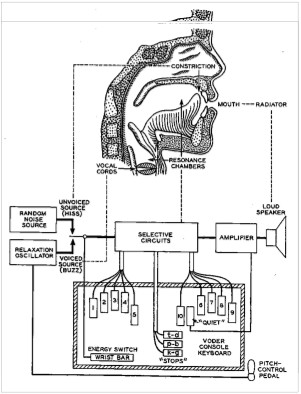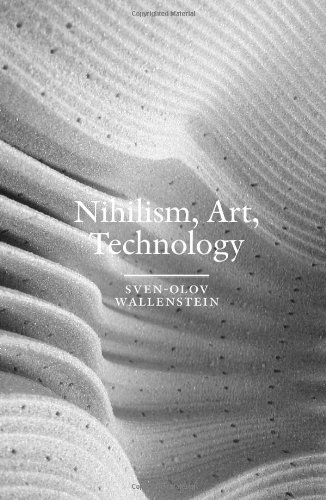Bernard Dionysus Geoghegan: The Cybernetic Apparatus: Media, Liberalism, and the Reform of the Human Sciences (2012)
Filed under thesis | Tags: · cybernetics, history of technology, liberalism, linguistics, structuralism, technology

“The Cybernetic Apparatus examines efforts to reform the human sciences through new forms of technical media. It demonstrates how 19th-century political ideals shaped mid-20th-century programs for cybernetic research and global science sponsored by the Rockefeller Foundation. Through archival research and textual analysis, it reconstructs how and why new media, especially digital technologies, were understood as part of a neutral and impartial apparatus for transcending disciplinary, ethnic, regional, and economic differences. The result is a new account of the role of new media technologies in facilitating international and interdisciplinary collaboration (and critique) in the latter half of the twentieth century.
Chapter one examines how political conceptions of communications and technology in the United States in the nineteenth century conditioned the understanding and deployment of media in the twentieth century, arguing that American liberals conceived of technical media as part of a neutral apparatus for overcoming ethnic, geographic, and economic difference in the rapidly expanding nation. Chapter two examines the development of new media instruments as technologies for reforming the natural and human sciences from the 1910s through the 1940s, with particular attention to programs administered by the Rockefeller Foundation. Chapters three and four examine the rise, in the 1940s and 1950s, of cybernetics and information theory as an ideal of scientific neutrality and political orderliness. These chapters demonstrate how programs sponsored by the Rockefeller Foundation, MIT, and other institutions shaped linguist Roman Jakobson’s and anthropologist Claude Lévi-Strauss’s efforts to redefine their fields as communication sciences. Chapter five considers how critics of cybernetics, including Noam Chomsky, Claude Shannon, and Roland Barthes, critically re-evaluated the claims of cybernetics to redefine the relations between technical research and the human sciences.”
PhD dissertation
Northwestern University & Bauhaus-Universität Weimar, 2012
262 pages
Author
Related paper by the author: From Information Theory to French Theory: Jakobson, Lévi-Strauss, and the Cybernetic Apparatus (Critical Inquiry 38, Autumn 2011)
PDF (6 MB, updated on 2021-3-9)
EPUB (2 MB, added on 2021-3-9)
Sven-Olov Wallenstein: Nihilism, Art, and Technology (2010)
Filed under thesis | Tags: · aesthetics, architecture, art, art history, avant-garde, nihilism, philosophy, technology

Beginning in an analysis of three paradigmatic instances of the encounter between art and technology in modernism—the invention of photography, the step beyond art in Futurism and Constructivism, and the interpretation of technology in debates on architectural theory in the 1920s and ’30s—this book analyzes three philosophical responses to the question of nihilism—those of Walter Benjamin, Ernst Jünger, and Martin Heidegger—all of which are characterized by an avant-garde sensibility that looks to art as a way to counter the crisis of modernity.
These responses are then brought to bear on the work of the architect Mies van der Rohe, whose “silence”—understood as a withdrawal of language, sense, and aesthetic perception—is analyzed as a key problem in the interpretation of the legacy of modernism. From this, a different understanding of nihilism, art, and technology emerges. These concepts form a field of constant modulation, which implies that the foundations of critical theory must be subjected to a historical analysis that acknowledges them as ongoing processes of construction, and that also accounts for the capacity of technologies and artistic practices to intervene in the formation of philosophical concepts.
Originally presented as a compilation thesis in theoretical philosophy, the work was published as a book by Axl Books in 2011.
Doctoral Thesis
Department of Philosophy, Stockholm University, 2010
ISBN 9789174470734
92 pages
Publisher (Thesis)
Publisher (Book)
PDF (Thesis; without images)
Comment (0)Rosemari Elizabeth Baker: Shklovsky in the Cinema, 1926-1932 (2010)
Filed under thesis | Tags: · art history, cinema, film, film history, literary theory, literature
“The following research project is grounded in the interrelated contexts of the Russian intelligentsia’s ambivalent engagement with post-revolutionary culture and cinema’s rise as an artistic medium and instrument of Russian cultural development. By examining Viktor Shklovsky’s earliest activities in the Soviet film industry, this project will explore how narrative, aesthetic, and ideological programmes were repeatedly and variously moulded, undermined, and complicated by the twentieth-century Russian avant-garde interest in dissolving creative boundaries between the domains of the ‘internal’ (embracing private, individual, and domestic concerns) and ‘external’ (their public, communal, and social counterparts) in a bid ‘to turn space outwards’ (vyvorachivat´ prostranstvo vovne). These critical enquiries will lend themselves to an investigation of how the behaviours of Shklovsky, his colleagues, and his artistic creations were affected by internal and/or external loci of control and how these activities were reconciled (if at all) in a society where the relationship between freedom and necessity was in a constant state of fluctuation.
This research aims not simply to establish the extent and significance of Shklovsky’s influence on cinema as an individual, but rather to utilise his personal narrative for an assessment of the levels of interaction between theory and practice and between the verbal and the visual as integral to the intelligentsia movement. The project will investigate the part that Shklovsky played in conceptualising the boundaries, exchanges, and conflicts that arose between different artistic media and the critical institutions that developed around them, before considering how these relations changed as Soviet culture entered and emerged from the period of Cultural Revolution. In addition, an exploration of the effects of personal and professional tensions between different ideological groups will not only develop a better understanding of Shklovsky’s role in the cinema as theorist, critic, polemicist, screenwriter, and ‘creative administrator’, but will also help to establish the similarities and/or disparities between his film-works and contemporary cultural experience.” (Abstract)
Master Thesis
Faculty of Arts and Humanities, Durham University
209 pages

